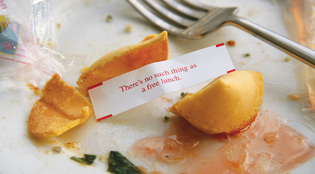 loading
loading
Arts & CultureYou can quote themYale law librarian Fred R. Shapiro is editor of the Yale Book of Quotations.  Photo illustration: John Paul ChirdonView full image
In a world in which economics has become a central discipline and the state of the economy a central concern, our public discourse seems more and more to be articulated in an economic tongue. In recognition of the recession, I devote this column to two of the best-known economic quotations. "There's no such thing as a free lunch" Friedman indeed used the saying as the title of a 1975 book, but it is much older. The acronym TANSTAAFL (for "There ain't no such thing as a free lunch") appears in Robert Heinlein's 1966 sci-fi novel The Moon Is a Harsh Mistress, as the slogan of a revolt by lunar colonists against their earthly overlords. Still earlier, it featured in the title of a 1949 book by Pierre Dos Utt, Tanstaafl: A Plan for a New Economic World Order. I've also found the "ain't" version in a June 1, 1949, editorial in the San Francisco News. A note states that the editorial is a reprint from 11 years earlier. But hunts through the microfilmed News of 1937–39 during research for the Yale Book of Quotations uncovered nothing. I despaired of ever nailing down the joke's origin. More recently, though, I have found a phraseological El Dorado in Newspaperarchive, a searchable database with over one billion newspaper articles going back more than 200 years. A search for "such thing as a free lunch" pulled up an article in the El Paso Herald-Post, June 27, 1938, entitled "Economics in Eight Words." This is a fable in which a king asks his advisers to summarize economics in a "short and simple text." They respond with 87 volumes of 600 pages each, drawing the king's wrath and accompanying executions. Further demands and more executions force ever-briefer summations, until, finally, the last economist, "a man of profound wisdom," speaks: "Sire, in eight words I will reveal to you all the wisdom that I have distilled through all these years from all the writings of all the economists who once practiced their science in your kingdom. Here is my text: 'There ain't no such thing as free lunch.'" "The dismal science" The phrase was coined by Victorian essayist-historian Thomas Carlyle. The Oxford Dictionary of Quotations cites Carlyle's 1850 book Latter-Day Pamphlets as first use. In fact, he used the phrase in an 1849 article, "Occasional Discourse on the Negro Question" (Fraser's Magazine, December), urging that slavery be reinstated in the West Indies so white plantation owners could find laborers. If blacks would not work under prevailing wages and conditions, he argued, they should be compelled to work. The sin of economics, Carlyle said, lay in extolling market forces over coercion: "The Social Science . . . which finds the secret of this universe in 'supply-and-demand,' and reduced the duty of human governors to that of letting man alone, is . . . not a 'gay science,' I should say . . . no, a dreary, desolate, and indeed quite abject and distressing one; what we might call, by way of eminence, the dismal science. " If this is "dismal," it strikes me as none too shabby. In the words of economist Robert Dixon, students of the field "can be proud to be associated with those economists who were the target of Carlyle's scorn."
The comment period has expired.
|
|